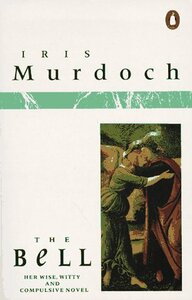You need to sign in or sign up before continuing.
Take a photo of a barcode or cover
funny
hopeful
reflective
sad
medium-paced
Plot or Character Driven:
A mix
Strong character development:
Yes
Loveable characters:
Complicated
Diverse cast of characters:
Yes
Flaws of characters a main focus:
Yes
emotional
reflective
slow-paced
A terrific gothic about relationships , our effect on the people around us, how what we repress has a tendency to return with destruction
dark
emotional
hopeful
inspiring
mysterious
reflective
sad
slow-paced
Plot or Character Driven:
Character
Strong character development:
Yes
Loveable characters:
Yes
Diverse cast of characters:
Yes
Flaws of characters a main focus:
Yes
Iris Murdoch’s writing remains iconic, but I am not crazy about this story. Especially the ending. I also don’t appreciate its perspective on gay people being only presented through the eyes of religious extremists. It prevents any acknowledgement, even within the gay characters themselves, that who they are is natural, normal, and not something to be ashamed of.
"By a dialectic well known to those who habitually succumb to temptation he passed in a second from the time when it was too early to struggle to the time when it was too late to struggle."
"In this holy community she would play the witch."
Absolutely loved this book. Superb plot and wonderfully flawed characters against a backdrop of religious communities, suppressed desire and the frailties of humans.
Absolutely loved this book. Superb plot and wonderfully flawed characters against a backdrop of religious communities, suppressed desire and the frailties of humans.
I think I'm officially a Murdoch fan (and it's definitely not because my idol of idols, A. S. Byatt, is also one, although that certainly helps). I sincerely enjoyed this -- well-characterized, well-observed, claustrophobic and intense in just the right way. Makes me want to go back to school to write a high-toned dissertation on this novel, the Blythdale Romance, and the of utopian communities.
Imber Court is a newly created religious commune for people who can’t live in society for whatever reason, but can’t take to a fully religious life either. The Court is attached to an Abbey of nuns who are never seen.
The plot mostly revolves around two characters: Dora, the young runaway wife of Paul, an academic, and Michael, the closeted owner of Imber Court. Both are wrestling with their place in society. Dora is told she must make it work with Paul. She is way too young for him; she was a student at the university where he was a professor. (Come on Paul!) Their personalities could not be more different and Paul is a horrible man. He emotionally abuses and belittles her throughout the novel. Michael keeps “falling for” (ahem) very young men (teens!). Dora and Michael make poor decisions right up until the end even when they think they’re doing the right thing.
It’s hard to not read The Bell through a modern lens. Today Reddit would tear Paul apart, and Michael would have a Netflix doc. Of course Dora should leave Paul. Of course Michael should live his life openly as a gay man. They’d both be happier. But it’s 1958 and neither of them can. Instead they have to fret over duty and follow the morality set by post-WWII society.
The Bell is heavy on Catholicism and philosophy. There are sermons. The nuns are treated like mythical mermaids rarely seen, except through gauzy curtains. The reader spends almost every moment in the heads of the characters who are struggling with some guilty dilemma. It’s a lot.
The action finally occurs near the end of the novel when the bell of the title really comes into play.
That’s not to say I didn’t like The Bell. It took me some time to wade through the hand wringing and as Noel says, ‘the neuroses’ of these characters but I did care about what would happen to them. I imagined great lives for them after the story’s conclusion. Except Paul. He can fall off a cliff.
The plot mostly revolves around two characters: Dora, the young runaway wife of Paul, an academic, and Michael, the closeted owner of Imber Court. Both are wrestling with their place in society. Dora is told she must make it work with Paul. She is way too young for him; she was a student at the university where he was a professor. (Come on Paul!) Their personalities could not be more different and Paul is a horrible man. He emotionally abuses and belittles her throughout the novel. Michael keeps “falling for” (ahem) very young men (teens!). Dora and Michael make poor decisions right up until the end even when they think they’re doing the right thing.
It’s hard to not read The Bell through a modern lens. Today Reddit would tear Paul apart, and Michael would have a Netflix doc. Of course Dora should leave Paul. Of course Michael should live his life openly as a gay man. They’d both be happier. But it’s 1958 and neither of them can. Instead they have to fret over duty and follow the morality set by post-WWII society.
The Bell is heavy on Catholicism and philosophy. There are sermons. The nuns are treated like mythical mermaids rarely seen, except through gauzy curtains. The reader spends almost every moment in the heads of the characters who are struggling with some guilty dilemma. It’s a lot.
The action finally occurs near the end of the novel when the bell of the title really comes into play.
That’s not to say I didn’t like The Bell. It took me some time to wade through the hand wringing and as Noel says, ‘the neuroses’ of these characters but I did care about what would happen to them. I imagined great lives for them after the story’s conclusion. Except Paul. He can fall off a cliff.





